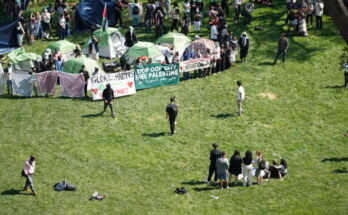By Marcelo Bravo-Lopez
On March 4, Lehman hosted a panel discussion titled The Deaths of Eric Garner and Michael Brown, sponsored by the Center for Human Rights and Peace Studies, the Department of Philosophy, and the Department of Anthropology. In addition, the symposium commemorated the 50th anniversary of the march that Martin Luther King Jr. led from Selma to Montgomery.
The panel consisted of Candace McCoy, Harold Moy, Frank Kirkland, and Paul Young. McCoy opened the event with words of guidance for symposium attendees, and a note that such events are likely to yield more questions than answers. The panelists examined the different aspects of the Garner and Brown cases. Topics included grand jury proceedings, community activism, and police brutality—a matter that has sparked massive protests in New York City.
Panelist Harold Moy, a senior law enforcement agent and firearms instructor with over 30 years of experience, called on the audience to consider the circumstances behind deadly physical force. “The idea behind giving an officer a weapon is to protect the public and themselves,” Moy said. “Your role, as a law enforcement officer, is not to be the punisher.”
An audience member asked about the surge in police misconduct lawsuits. In 2014, the City of New York paid out $212 million for claims against its police department. “Where do you think the settlement money comes from?” asked Moy. “It’s your tax dollars! The government doesn’t win, law enforcement doesn’t win, and the public doesn’t win. It’s a lose, lose, lose situation.”
Candace McCoy, a criminal justice professor at John Jay College, followed with a call for police accountability. “You think that [lawsuits] are just bad—frankly I think they’re great. Litigation and lawsuits are what significantly lowered the stop and frisk policies of the NYPD—otherwise they would’ve kept going.”
Lehman student Damian Tejada agreed with McCoy and added, “I’m happy that we’re having this [event] but I’m a little upset that the panel is not a majority people of color. This should be a place for us to say what we feel. We need the perspective of the people who are dealing with this directly.”
When the moderator, Lehman Philosophy professor Marcello Di Bello t scanned the room to take another question, an audience member interjected, “Can you give the mic to a black person? We are the victims here—in a lot of this.”
The discussion turned to the iconic yet divisive mantra of social media campaigns and nationwide demonstrations: “Black Lives Matter.” One student took issue with the phrase and countered with “all lives matter.” In response, another audience member defended the original phrase, saying, “It’s not about trying to be better than anyone else. We need to state ourselves as individuals and as one race first.” According to Alicia Garza, co-founder of blacklivesmatter.com, the slogan affirms black humanity while promoting unity in public demonstrations.
Frank Kirkland, a philosophy professor at Hunter College, also examined key language from the protests. He chose “justice.” Kirkland warned against having complete trust in the criminal justice system. “The administration of justice is never identical with the idea of justice,” he said. “[The administration] must act in accordance with justice, not be identical to it.” When asked if the shootings in question could be justified, Kirkland answered with a prompt “no.”
Paul Young, writer of Kentucky Cantata, urged the audience to explore what the arts have to say about social issues. His play tells the story of a young actress who leaves Kentucky to pursue her dream career in New York City. She is brutally raped in a parking lot, and an immigrant taxi driver named Kareem is falsely accused of the crime. Young’s alienated character faces deportation under the scrutiny of negative racial attitudes. “Even though I’m white, I use my craft to bring attention to these issues and foster discussion” Young said.
By the end of the night, the diverse group of panelists shared varied insights that converged at the theme of civic participation. “It’s on all of you—the students.” Candace McCoy said. “Change is only going to happen from the bottom up.”



